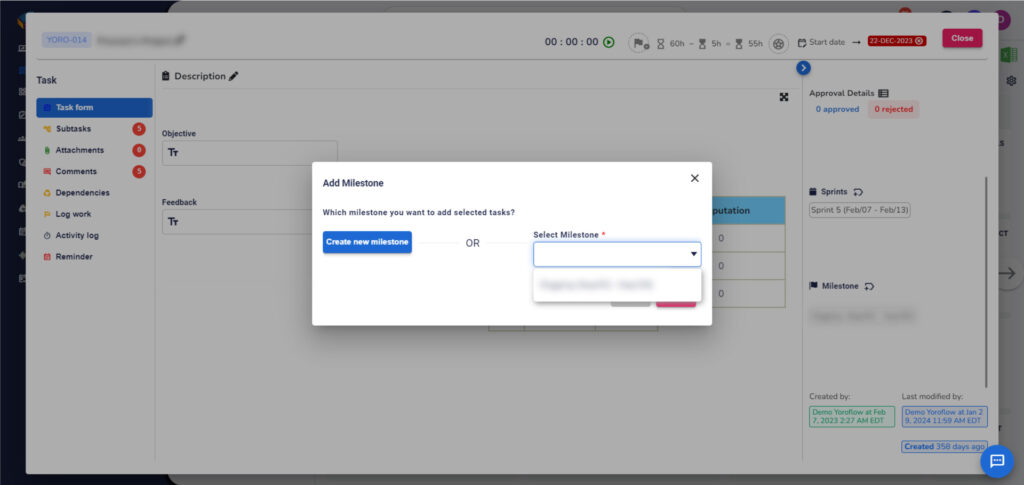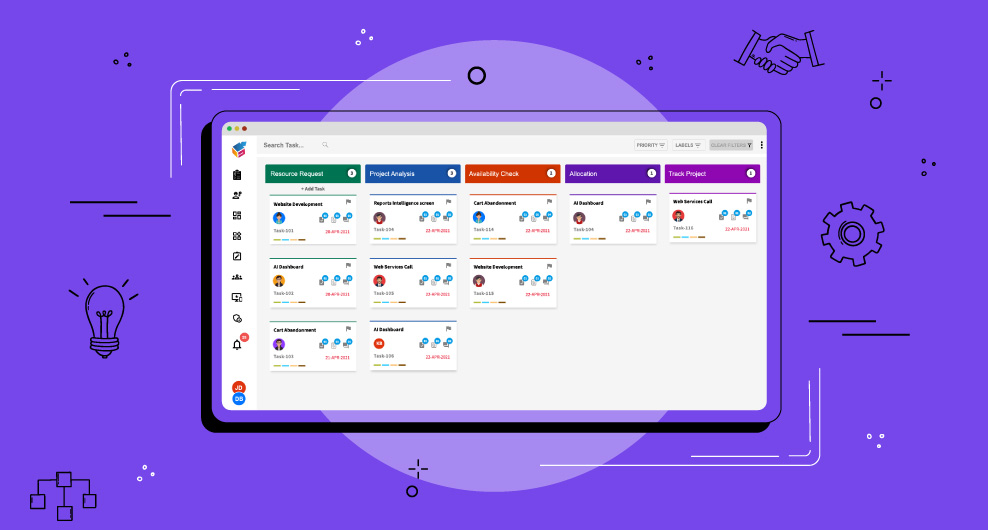Table of Contents
“The world economy is going through a tough time, and many people are quietly leaving their jobs, while employers are hiring without making much noise. Almost everyone, except for sheep farmers and sculptors, is worried that artificial intelligence might take away their jobs. It’s clear that businesses are going to face challenges for a while, which makes managing people a bit harder.
The HR department has a lot on its plate. The big question is, is it ready for the challenge?
Can HR professionals balance be making work good for employees while also meeting the goals of the business? They have a good understanding of people, but there’s one problem: they need better project management skills.”
Let’s discuss that.
What is HR project management
HR project management involves the application of project management principles and techniques specifically within the context of human resources. It focuses on planning, executing, and overseeing projects that are related to HR functions and initiatives.
HR project management involves defining project goals, creating plans, allocating resources, managing timelines, and evaluating project outcomes. It requires collaboration with various stakeholders, including HR professionals, executives, and employees, to ensure the successful implementation of HR initiatives that align with organizational objectives.
What are the benefits of HR project management?
HR project management offers several benefits to organizations in efficiently managing human resources-related initiatives. Here are some key advantages:
- Improved Efficiency: HR project management ensures a structured approach to HR initiatives, leading to better planning, resource allocation, and execution. This enhances overall efficiency in HR processes.
- Clear Project Objectives: Well-defined project goals and objectives help in aligning HR initiatives with the organization’s strategic objectives. This clarity enables teams to work towards common goals.
- Enhanced Communication: Project management frameworks facilitate clear communication among HR teams, other departments, and stakeholders. This transparency ensures everyone is on the same page regarding project progress, challenges, and achievements.
- Resource Optimization: Efficient use of resources is a critical aspect of HR project management. It helps organizations allocate human and financial resources effectively, preventing waste and ensuring maximum output.
- Risk Management: Identifying and managing potential risks is a fundamental aspect of project management. In HR initiatives, this involves anticipating challenges such as resistance to change or potential legal issues and developing strategies to address them proactively.
- Timeline Adherence: HR project management helps set realistic timelines for HR initiatives and ensures that they are adhered to. This timely execution prevents delays in crucial HR processes, such as recruitment or training, which can impact overall organizational performance.
- Stakeholder Satisfaction: By involving key stakeholders, including employees and top management, in the project management process, organizations can ensure that HR initiatives meet the needs and expectations of all relevant parties.
- Measurable Outcomes: Establishing clear metrics and Key Performance Indicators (KPIs) allows organizations to measure the success of HR projects. This data-driven approach enables continuous improvement and informed decision-making.
- Adaptability to Change: HR project management frameworks emphasize flexibility, allowing organizations to adapt to changes in business environments, industry trends, or internal priorities while still achieving project goals.
- Professional Development: Implementing project management practices within the HR function provides HR professionals with valuable skills and experience in managing complex initiatives, contributing to their professional development.
Overall, HR project management contributes to the effectiveness of HR functions within an organization, ensuring that human resources are strategically managed to support the achievement of broader business objectives.
How Yoroproject can help with HR project management
Task and Project Tracking:
- Tools like Yoroproject typically offer features for creating and tracking tasks, allowing HR teams to manage various aspects of projects, such as recruitment, training, or performance management.
Collaboration and Communication:
- Effective communication is crucial in HR projects. Project management tools often provide collaboration features, including discussion forums, document sharing, and real-time updates, fostering better communication among team members.
Timeline and Deadline Management:
- HR project managers can use these tools to set timelines, deadlines, and milestones. This helps ensure that projects stay on track and are completed within specified timeframes.

Resource Allocation:
- Project management tools often include resource management features, allowing HR professionals to allocate human and financial resources efficiently. This is particularly beneficial in tasks like recruitment or training program implementation.
Workflow Automation:
- Automation features can streamline repetitive tasks in HR projects. For instance, automating certain stages of the recruitment process or onboarding workflows can save time and reduce the likelihood of errors.
Document Management:
- Centralized document storage and management features help HR teams organize and access important project documents easily. This is especially useful for projects involving policy updates, training materials, or legal documentation.
Reporting and Analytics:
- Yoroproject, or a similar tool, might offer reporting and analytics features that enable HR professionals to track key performance indicators (KPIs) and assess the success of HR projects. This data-driven approach supports informed decision-making.
Integration with HR Systems:
- Integration capabilities with other HR systems, such as HRIS (Human Resources Information System), can enhance the overall efficiency of HR project management. This ensures seamless data flow between different aspects of HR functions.
Before choosing or using Yoroproject for HR project management, it’s advisable to check its specific features, user reviews, and any updates or changes to the platform.
Evaluate how well it aligns with your organization’s needs and the specific requirements of your HR projects.




